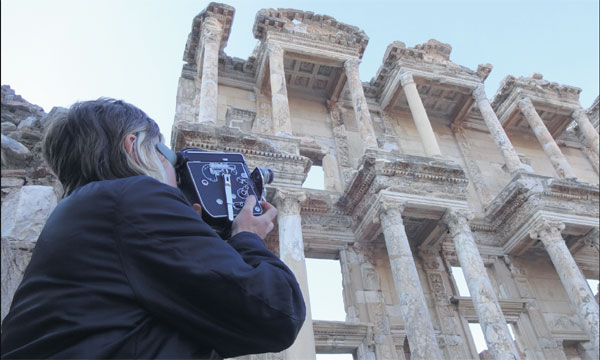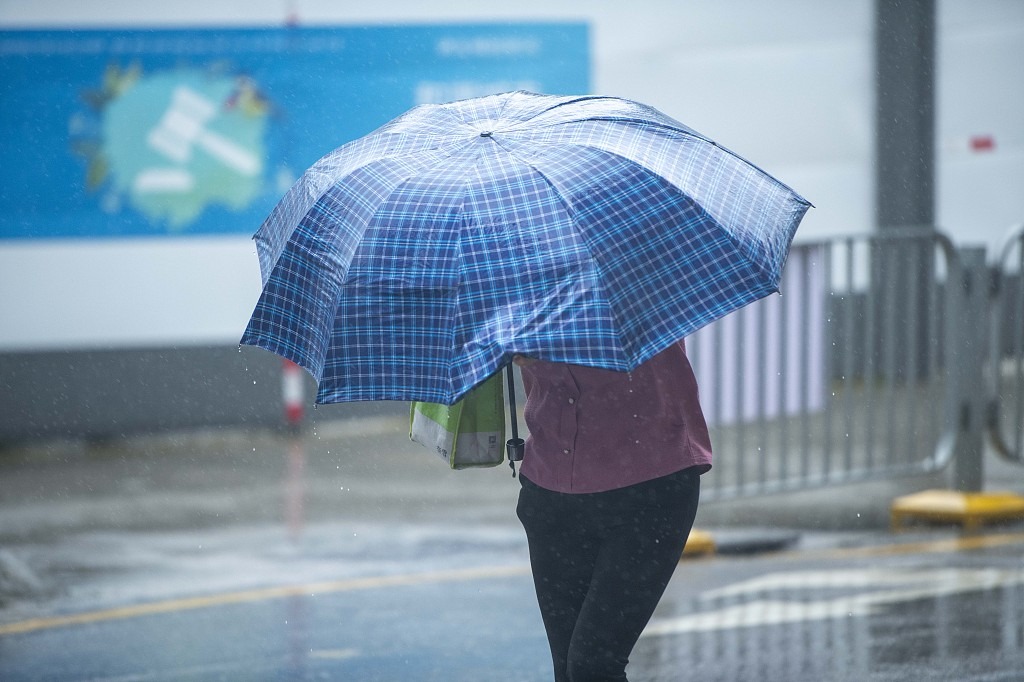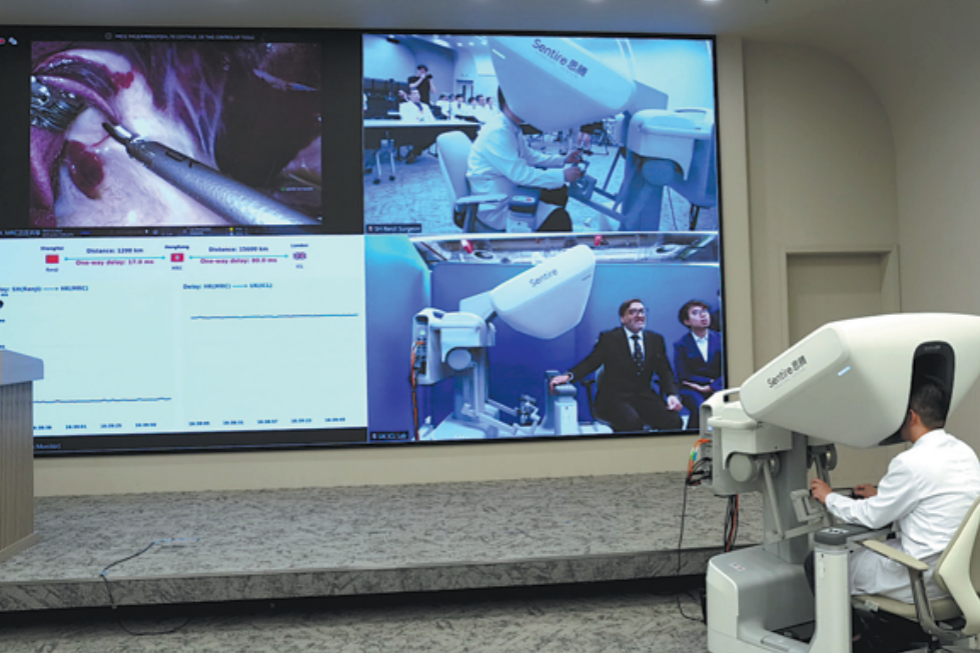Seeking lost libraries along the silk road

British artist's six-month journey by motorbike took her to sites in China, Uzbekistan, Turkey, Egypt, Italy and Iran
British artist Abigail Reynolds recently embarked on a six-month journey in search of lost libraries along the ancient Silk Road route, traveling by motorbike.
The artist, based in Cornwall, England, followed a route to trace and document 16 libraries lost to conflicts, natural catastrophes and war. It resulted in her visiting locations dating from 291 BC to 2011 in China, Uzbekistan, Turkey, Egypt, Italy and Iran.
"The journey itself was challenging and huge, encompassing three-quarters of the globe, traversing multiple cultures, none familiar to me," she says. "The journey took me to the edges of my knowledge, just as the lost libraries took me to the edge of visuality."
| Abigail Reynolds plans a book incorporating images, texts and other documents originating from her experience, as well as moving-image works using her 16mm footage. Photos Provided to China Daily |

She says she chose the Silk Road because it is a symbol of exchange among cultures.
"The Silk Road was open for the longest time, and it was always a positive symbol of connection and communication," she says. "I knew that there would be libraries along that route, because books were a precious commodity, along with silk, gold, medicines and all the other things that empires desire."
Reynolds loved the idea of following the same path taken by well-known figures before her.
"There were some very well known, celebrated libraries that were lost and found along the Silk Road, and I enjoyed the idea that I would be following a meaningful line and making a journey that many people had made before me, such as Marco Polo and Muhammad Ibn Battuta." The first leg of her arduous journey was in China - Yinchuan in the Ningxia Hui autonomous region, Xi'an in Shaanxi province and Dunhuang in Gansu province.
She relied on her motorbike to get around and a 16mm, wind-up Bolex camera to capture her adventures. But finding the libraries was not an easy task.
The oldest lost library on the Silk Road was the Xianyang Palace in Xi'an, which was destroyed around 261 BC. All that remains today is a wasteland, and she was advised to visit the Terracotta Warriors settlement near the area instead, but she persisted.
"No one wanted me to go to the Xianyang Palace site," she says. "The guides who were there told me it did not exist. I just had to do a lot of arguing. In fact, there is a museum there."
Although the site is decrepit and dusty, Reynolds says there was "something realistic and beautiful about that".
She describes the Mogao caves in Dunhuang as an incredible find. The library there was discovered more than 150 years ago, and "there were scrolls that have been collected from all the cultures that fed into the Silk Road".
The language barrier also gave rise to another set of challenges.
"I don't speak any Chinese, and I don't recognize the writing or read the body language," Reynolds says.
"When I was in Xi'an, I didn't know the word for rice, which now I know, so I had to draw a bowl of rice and everyone in the restaurant thought this was hilariously funny and they passed around my drawing. But I got the rice."
Reynolds has always been fascinated with libraries, having "lived a life around books as well as visual art".
The artist even worked as a bibliographical citations assistant for the Oxford English Dictionary.
"I often think about communities of people and how these communities shift and change through time, how our ideals change, and the library for me is like a portrait of a community," she says.
Reynolds is now involved in a community group fighting to save her local library from closure. "On the news, there are so many reports of the destruction of cultural sites in Iraq, like in Mosul and Palmyra, and I am aware of libraries being lost in Damascus," she says.
"So the sense of the loss of a library is something which is extremely contemporary but also ancient, and a subject that is very close to me at home in my personal life."
The result of her epic journey through 2,000 years of history and across much of the globe is Ruins of Time: Lost Libraries of the Silk Road, an exhibition held at Art Basel earlier this year in Hong Kong.
She says her exploration is more important than ever following Britain's decision to leave the European Union.
"At the moment, I feel, particularly in the UK, that we are turning away from a lot of good decisions that were made, about being a part of the EU, about embracing otherness, becoming more liberal, more tolerant, more interested in differences," Reynolds says.
"All of these things are really important to me, in terms of my cultural identity. I feel dismayed that the wider culture that I belong to seems to be rejecting these principles that I think are so important."
Reynolds says that as a woman, traveling solo, she faced unfamiliar places and cultures that were quite difficult at times.
"I knew I'd be traveling in Iran and I would need to wear the hijab, but the actual physical experience of wearing the hijab was so outside my experience.
"I was terrible at wearing the hijab, it kept slipping off," she says.
"And it was difficult to remember that you must not shake hands with a man. I feel that as an artist I had experiences which I think will take me a long time to fully process or understand, and that of course has an impact on my work."
In Cornwall, Reynolds uses a motorbike to commute to her studio, and she decided to use the same method of transportation for her journey to make the adventure more "her own".
Traveling by motorbike, Reynolds was able to meet people she would not normally meet, an aspect she says she really enjoyed.
She also emphasizes the importance of being "connected and physical" in her trip.
"I would not join a tour group in a coach because you'd just be stuck on this thing which isn't even your decision. I just feel like you would lose all agency, lose all your ability to do things your own way, which is the opposite of what I like. Being on a motorbike, you're really connected to your environment because you're vulnerable. You're very aware all the time of everything around you. I really value that feeling."
Reynolds, who studied English literature at Oxford University, now plans a book incorporating images, texts and other documents originating from her experience, as well as moving-image works using her 16mm footage.
boleung@mail.chinadailyuk.com
(China Daily European Weekly 07/21/2017 page20)
Today's Top News
- ?Typhoon Wipha pummels Guangdong province
- Japan's ruling coalition faces tight election test
- 'Pet' major launched as demand surges
- EU's sanctioning of Chinese financial institutions unjustifiable
- China coastal regions brace for Typhoon Wipha
- Premier stresses high-quality implementation of major national projects































